B Corps Build Positive Social Impact with Workplace Strategies and Community Partnerships
September 28, 2023
A Look at the S in ESG: Creating Policies and Products to Help All People Thrive
Businesses affect society in many ways. From worker pay to supply chain partnerships, from local community support to hiring practices, companies can create positive social impact with ripples of added benefit for people.
With environmental, social, and governance (ESG) impact improvement as a strategy for using business as a force for good, Certified B Corporations broaden their focus beyond maximizing profit. Through innovative practices, policies, and products, B Corps strive to improve their social impact — how they affect customers, workers, community, and others. In tandem with the B Impact Assessment used for B Corp Certification, these strategies can help B Corps and other companies chart a path toward ESG impact improvement and a more inclusive, regenerative economy. As Tynesia Boyea-Robinson of CapEQ said during a recent B Lab U.S. & Canada webinar on the ESG policy landscape: “The ‘S’ is basically where the diversity, equity, and inclusion work lands. It’s about human rights, it’s about equality, it’s about basic fairness.”
By reshaping social impact strategies and practices, B Corps are creating more sustainable, inclusive workplaces. The examples that follow highlight products, services, and partnerships that demonstrate how businesses can build ripples of positive impact.
NextOPP: A Giveback Model That Helps Domestic Violence Survivors Fight Financial Abuse
The women-owned B Corp recruiting agency nextOPP is built on a one-for-one model. For every candidate hired through nextOPP’s for-profit recruiting side, the company donates career coaching services to a survivor of domestic violence working toward financial independence. When Co-Founders Rebecca Oppenheim and Gail Tiburzi Buck decided to launch their own recruitment agency, they knew they wanted to incorporate a giveback program. “That’s when the one-for-one model clicked, and Hire One Help One was born,” Oppenheim said.
They learned from research that financial abuse is a factor in nearly all domestic violence cases. “We realized our skill set as recruiters could help survivors find financial independence, rebuild their lives, or potentially get out of an abusive relationship for good,” Buck said.
The B Corp partners with local organizations in New York, Connecticut, and South Carolina that are committed to serving survivors of domestic violence. “We teach essential career skills through one-on-one consultations as well as in-person and virtual workshops,” Oppenheim said. Workshops help participants identify job-relevant skills, craft resumes and job applications, and navigate interviews and hiring negotiations.
For other B Corps and businesses considering community partnerships, Buck recommends evaluating how your company can make a difference and find corresponding nonprofits that could use support. “It needs to be something you are passionate about because it’s going to be a long-term commitment,” she said.
Be patient and persistent when seeking partnerships, as nonprofits might have limited resources. “It can take a number of follow-ups and conversations to find the best way to offer pro-bono services or support the work they are doing in the community,” Oppenheim said.
Start small and build from there to balance a company’s for-profit work with a giveback model, start small and build from there. “It doesn’t happen overnight,” Buck said. “You quickly find what works and what doesn’t, and can keep multiplying your successes while maintaining balance.”
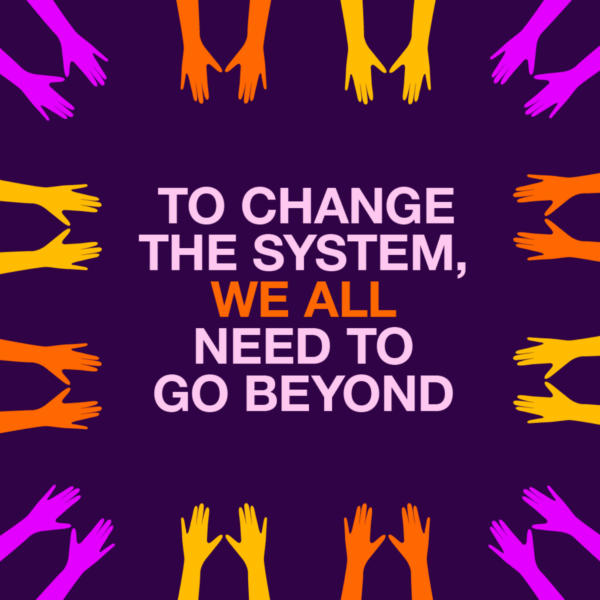
We Go Beyond
This guide from B Lab U.S. & Canada features B Corp collaboration examples to help more businesses and organizations find ways to go beyond their own impact to support other companies, community members, and more.
Aisle: Business Partnerships Shift the Burden of Cost for Menstrual Products
With a product designed for sustainability, Aisle has amplified its positive impact by partnering with public organizations. Founder Madeleine Shaw tapped her background in social change leadership to launch the reusable menstrual products business in 1993, becoming a B Corp in 2012. Since then, the multiple Best for the World awardee B Corp has amplified its positive impact through partnerships that help create more equitable access to menstrual health. “We are a for-profit consumer products business; but that’s just the how to the why,” Shaw said. “Our mission increasingly has become to upend how the consumer marketplace works.”
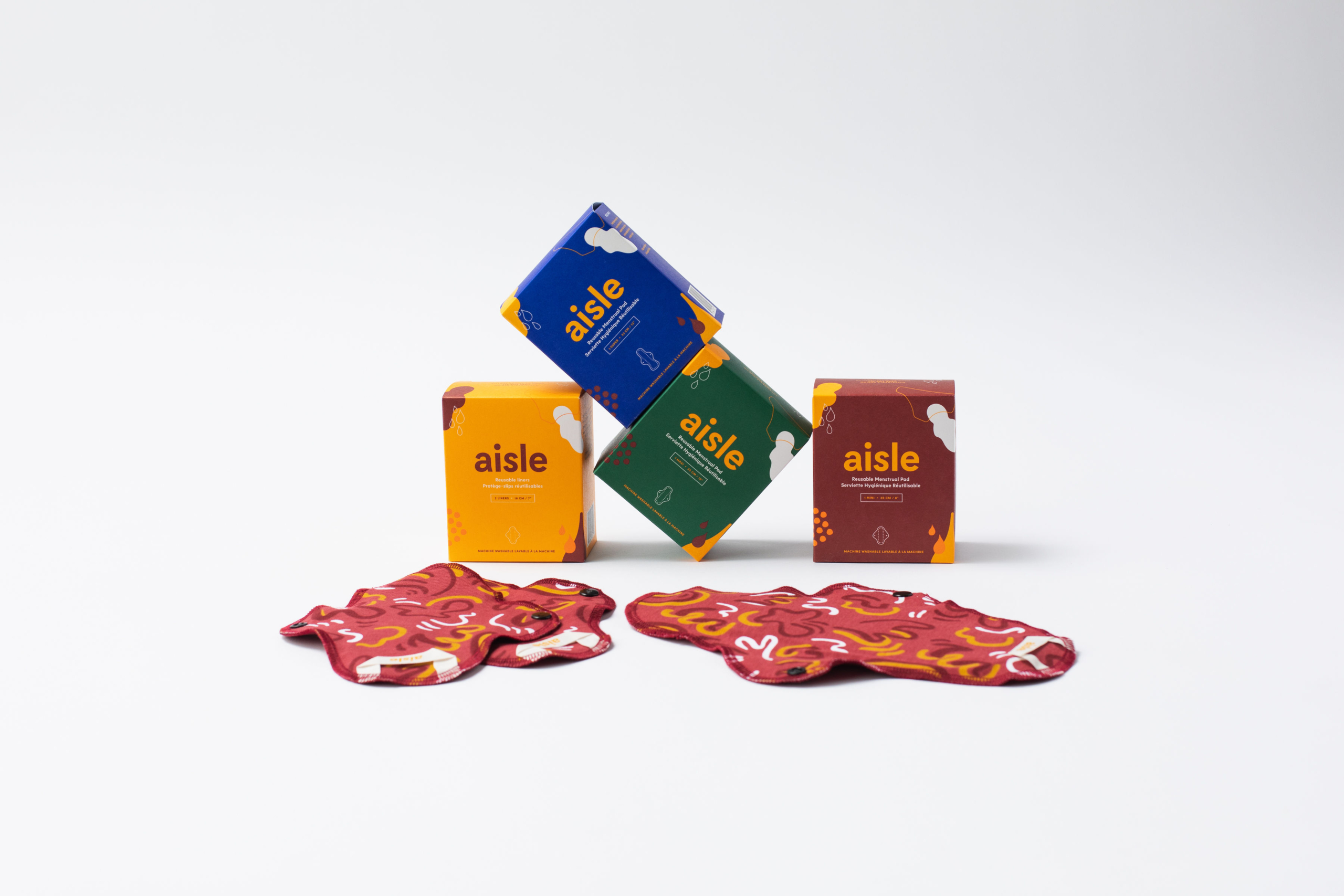
With a product designed for sustainability, B Corp Aisle has amplified its positive impact by partnering with public organizations.
For the menstrual products industry, that means shifting the onus of procurement — who actually pays for the products — from individuals to organizations that provide them for free to workers and students. It’s a change Shaw calls the democratization of the marketplace, and it’s gaining momentum thanks to global advocacy and legislation. “It’s becoming increasingly recognized that the onus should not be on individuals to purchase these expensive necessities, but rather the institutions where people with periods live, learn, and work,” Shaw said. “That in my eyes is one of the greatest victories, for ourselves as leaders but also for the movement.”
Aisle’s menstrual health and equity programs have spanned both the Global South and Global North, with an increasing emphasis on shifting product and education provision from a traditional donation/charitable model to innovative partnerships and even investment in locally-based initiatives. Aisle originally served as a mentor for Uganda-based AFRIpads as a startup in 2008 and is now an investor in the business that has become the world’s leading social enterprise manufacturing reusable menstrual pads and period underwear. “For us to be able to actually get on board with them in that way felt significant,” Shaw said. “When you have the ability to be part of re-imagining traditional power dynamics to make them more equitable and locally based, it’s a wonderful thing.”
Tux Creative: Reshaping the Work Schedule to Encourage Creativity
Montreal- and Los Angeles-based Tux Creative has its roots in love as an agency founded by professional and life partners Dominic Tremblay and Ludwig Ciupka. The agency has been LGBT+ Certified through Canada’s 2SLGBTQI+ Chamber of Commerce since 2012 and became a B Corp in 2016. It uses a stakeholder lens to shape its design, branding, and communications services. Co-Founder Dominic Tremblay says that means the agency prioritizes the needs of its clients, customers, and shareholders, as well as its workers, talent, suppliers, and local community.
Influenced by his years of work in corporate marketing, Tremblay and his partner wanted to create a values-based agency with a focus on inclusion, community, and economic development. “Every person that joined us through that journey believes in the same system,” he said.
Almost two years ago, Tux Creative shifted to a four-day workweek. The move emerged from a desire to create a more sustainable workplace that nurtures creativity and personal well-being. It’s a unique move in an industry where billable hours boost the bottom line, Tremblay said. But he decided after finding research confirming how downtime benefits creative pursuits. “If we are more relaxed, recharged, and have a better lifestyle, then we believe that creative output will be better,” he said. “We’re on a quest to build recharge moments for employees. … Those idle moments are often when you get creative.”
To create positive impact at the community level, Tux Creative launched its nonprofit, the Karma Foundation. The B Corp contributes a percentage of its profits and employee hours toward projects that help advance solutions to challenges such as poverty, climate change, and social justice. Tremblay said the agency hopes to build its relationship with underserved communities and further diversify its workforce and the creative industry to pursue impact improvement. “It’s more about how can we be better as a company ourselves, how can we treat people better? And how can we push and move forward our industry.”
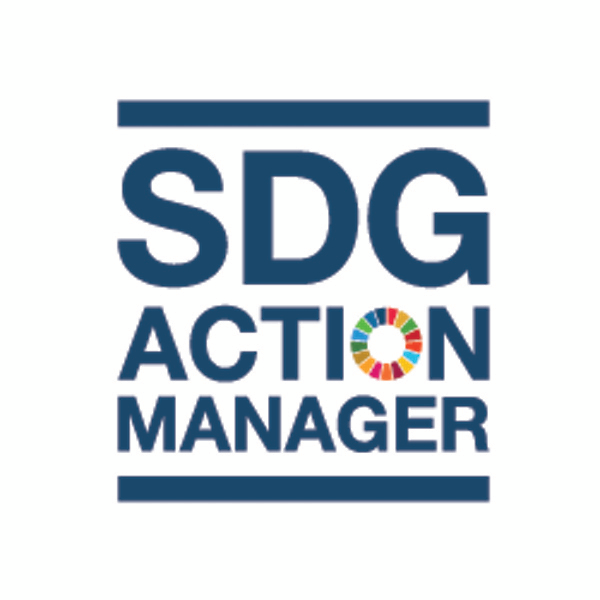
SDG Action Manager
To support businesses pursuing the Sustainable Development Goals (SDGs), B Lab and the United Nations Global Compact along with content advisors developed the SDG Action Manager. This impact management solution enables businesses worldwide to set goals, track progress, and stay motivated on their actions toward the SDGs.
A Coalition to Connect Workforce Policies with Long-Term Value and Stakeholder Relations
One investor-composed organization aiming to help companies improve their social impact is the Human Capital Management Coalition (HCMC). Made up of 36 institutional investors representing over $9 trillion in assets, HCMC is led by Cambria Allen-Ratzlaff, Managing Director and Head of Investor Strategies at JUST Capital, and Tamara Sells, Associate Investment Manager at the California Public Employees’ Retirement System. Allen-Ratzlaff and Sells coordinate the group’s efforts to help investors, companies, and other market participants understand and improve how human capital management contributes to creating and protecting long-term shareholder value.
To help investors and others understand a public company’s workforce policies and practices, HCMC supports mandatory reporting of four foundational human capital disclosures:
- Number of workers, including employees and independent contractors.
- Total cost of the workforce.
- Employee turnover, including actions to attract and retain workers.
- Diversity data, including diversity by seniority.
This information can help investors better understand a company’s workforce management strategy and identify potential areas of risk and opportunity, Allen-Ratzlaff said. For investors seeking to go beyond shareholder return and drive social impact, the same data could be used to provide a critical baseline understanding of a firm’s labor resources to help contextualize more targeted data on worker wellbeing, wellness, and engagement.
Research from JUST Capital on the state of corporate reporting on the workforce supports the HCMC’s push for higher-quality data, showing that disclosure of workforce metrics is low across the board despite calls for stronger information by investors. The relative lack of data stands in contrast to the increasing realization among the investment community that investing in companies that are better employers is a recipe for long-term success.
“At JUST Capital, our central thesis is that companies that are better at managing their stakeholder relationships — including, and perhaps especially, their relationships with their workers — tend to generate higher returns for their investors,” Allen-Ratzlaff said. “In JUST Capital’s nine years of polling the American public, we’ve learned that they expect companies to prioritize their workers by investing in good jobs, paying a fair and living wage, investing in training and advancement, providing good benefits and work-life balance, and ensuring a safe and healthy workplace. Happy, stable workers make profitable, stable companies.”
-
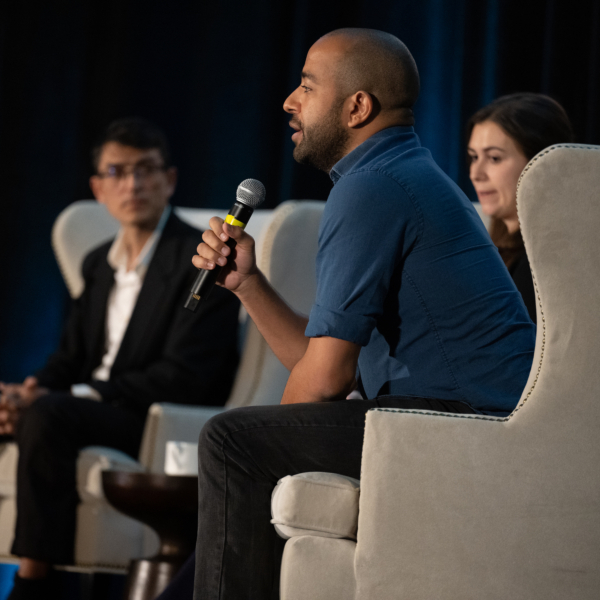
-
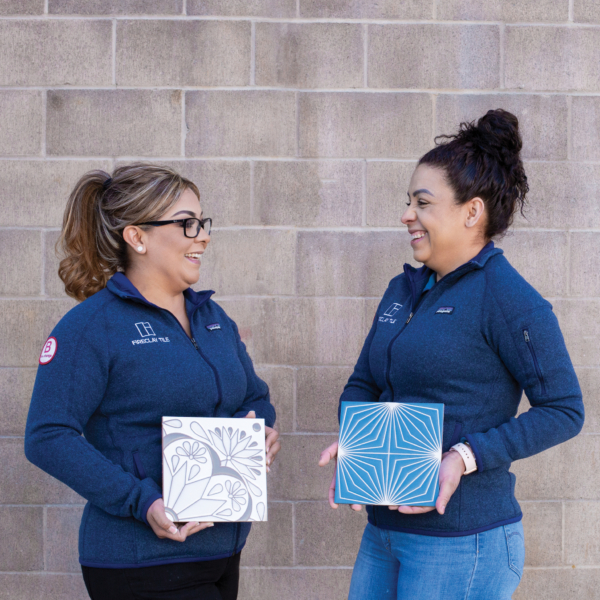
Workplace Culture
Employee Ownership for Any Business Size: B Corps Chart a More Inclusive Path
Read More -

Business Strategy
Mission-Aligned Ways That B Corps Are Supporting Employees During the Great Resignation (and Beyond)
Read More -

Anti-racism
How Companies of All Sizes Can Use Pay Equity Practices to Address the Racial Wealth Gap
Read More
Sign Up for our B The Change Newsletter
Read stories on the B Corp Movement and people using business as a force for good. The B The Change Newsletter is sent weekly.
